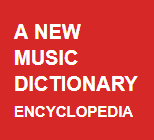Now available! eBooks on Learning the Language of Music
The Purpose of the New Music Dictionary Encyclopedia (#ANMDE)
To correct the errors and omissions of definitions, translations, and theories in music dictionaries, music text books, and the web. Definitions are the essence of education. Without definitions, correct definitions, and usable definitions, one is working with mere opinion and ‘bright ideas’ of well-meaning authors of music text books.
We are working with every source available to provide the correction of errors and omissions via unabridged dictionaries, encyclopedias, and with the scores of music composers. We want to work with you, our readers to validate, correct if need be, and to comment on our work, our philosophy, our purpose, because we value you. Please send comments to [email protected].
Learning a New Language: Music
Music is a language since it communicates. That’s what languages do. The spoken word communicates with words; nouns, verbs, adjectives, etc.. Music communicates with sounds organized as scales and chords; major, minor, dominant, etc.. Learning the language of music is no different than learning any other foreign language since both use the same principles and structure, music expressing the character or mood of what is being ‘said’; the abstract, while the spoken word expresses the concrete; people, places, things, etc.
Definitions are the absolute basis of understanding anything, especially a language, and the dictionary is the portal through which words, ideas, and concepts are defined. Music theory lacks much of the necessary definitions, and the printed score also lacks definitions of words used by composers to guide the musician to his intent. Italian is the basic language of music, but composers also use words in their native tongue; French, German, Spanish, etc. Words and symbols in any such language guide the musician toward a meaningful understanding of their printed score. Many of these words need not only definitions, but in many cases, clarification.
One of the greatest pianists of the 19th century, Josef Hoffman had this to say…
“What is the meaning of the words Adagio, Andante, and Allegro? Are they just indications of speed? They serve as such; though our musical ancestors probably selected these terms because of their indefiniteness, which leaves a certain margin to our individuality. Literally Adagio (ad agio) means “at leisure.” Andante means “going” in contradistinction to ‘running,” going apace, also walking. Allegro (a contraction of al leg-gie-ro) means with “lightness, cheerful.” Primarily these terms are, as you see, indications of mood; but they have come to be regarded as speed annotations.” …from his book, ‘Piano Playing’.
This ‘New Music Dictionary Encyclopedia’ is a new effort in elucidating the meanings of titles and directives in the works of various composers with definitions, examples, and videos.
How to Use This Dictionary
Enter the word you wish to look up in ‘search’. If you aren’t sure how to spell the word, or if the word doesn’t come up, search the first letter of the word. All words starting with that letter will be there. If it isn’t, let us know at [email protected] and what composition you found it in. Thank you!
